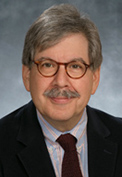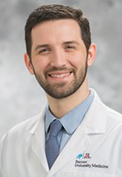
UA Phoenix Among First in the Country to Create an Accredited Addiction Medicine Fellowship

The University of Arizona College of Medicine – Phoenix is at the forefront of helping solve America’s biggest public health issue: the opioid epidemic.
The College has created an Addiction Medicine Fellowship Program and revamped its medical school curriculum to address the thousands of opioid-related deaths each year.

Comprehensive addiction training is uncommon in medical education. The college has teamed up with Banner – University Medical Center Phoenix and the Phoenix VA Health Care System for the fellowship.
“We recognize that substance use disorders affect millions of Americans and is a condition that is seen through various setting of health care,” said Anita Karnik, MD, director of the fellowship program. “We hope to train physicians to be change agents, teachers and provide excellent care. We hope to increase awareness of substance use disorders and decrease any stigmatization associated with addiction treatment.”
Dr. Karnik, an addiction psychiatrist at the Phoenix VA, created the program with Luke Peterson, DO, an addiction medicine specialist at Banner – University Medical Center Phoenix.
“Current medical students and residents in the U.S. traditionally have not received extensive, evidenced-based education about the treatment of addiction or pain as chronic disease,” Dr. Peterson said. “This has led to misconceptions about what substance use disorder is, how best to treat it, and the overlapping vulnerabilities of addiction and chronic pain.

The Addiction Medicine Fellowship Program, sponsored by the Arizona Health Care Cost Containment System (AHCCCS), operates under the College of Medicine – Phoenix and is accredited by the Accreditation Council for Graduate Medical Education (ACGME). The college is one of nearly 50 fellowships that were granted accreditation.
The one-year fellowship includes clinical rotations at Banner – University Medical Center Phoenix and the Phoenix VA Health Care System.
Fellows also will spend time at Banner, rotating through the Addiction Recovery Center, Addiction Consult Service and Toxicology Service. They will rotate through Banner Behavioral Health Hospital in Scottsdale, Arizona, to have an experience in detoxification services. Fellows will have an intensive outpatient experience in substance use therapy. Throughout the year, fellows will learn therapy modalities of motivational interviewing, cognitive behavioral therapy, group therapy and other important substance abuse therapy modalities.

“We are desperately in need of more addiction medicine specialists,” Dr. Karnik said. “Many physicians often feel unprepared to manage care for the patients they see who have addiction. We are enthusiastic to increase the workforce of addiction specialty trained physicians who can help us combat this national epidemic.”
The Addiction Medicine Fellowship is a collaborative effort of many specialties with faculty from a variety of backgrounds. The fellowship hopes to attract applicants to promote health and wellness for patients who are often seen in various treatment settings.
Applications are open for two positions starting July 2019. The fellowship is accepting applications from physician applicants from various specialties including but not limited to Psychiatry, Family Medicine, Internal Medicine, Emergency Medicine, Obstetrics and Gynecology, Anesthesiology, Pediatrics and Preventative Medicine.
In addition to the fellowship, Dr. Peterson along with other educational leaders from the College of Medicine – Phoenix and 17 Arizona undergraduate health educational programs, developed a statewide opioid curriculum that calls on all provider types to address the public health emergency.

“Teaching future physicians and developing current physicians to understand alternative methods of management is important and when prescribing opioids for pain, to do so responsibly,” Dr. Manriquez said. “The medical, dental and even veterinary community have to take a good look at their practices and appreciate that we are a part of the problem occurring in society, but we are also the best equipped to be a huge part of the solution.”
The University of Arizona College of Medicine – Phoenix is currently undergoing an audit of its entire curriculum to identify where Opioid Action Plan curriculum already exists. The audit is being led by Cinda Stone, MEd, director of curricular management. The college already meets 43 of the 73 proposed statewide objectives.
About the College
Founded in 2007, the University of Arizona College of Medicine – Phoenix inspires and trains exemplary physicians, scientists and leaders to advance its core missions in education, research, clinical care and service to communities across Arizona. The college’s strength lies in our collaborations and partnerships with clinical affiliates, community organizations and industry sponsors. With our primary affiliate, Banner Health, we are recognized as the premier academic medical center in Phoenix. As an anchor institution of the Phoenix Bioscience Core, the college is home to signature research programs in neurosciences, cardiopulmonary diseases, immunology, informatics and metabolism. These focus areas uniquely position us to drive biomedical research and bolster economic development in the region.
As an urban institution with strong roots in rural and tribal health, the college has graduated more than 1,000 physicians and matriculates 130 students each year. Greater than 60% of matriculating students are from Arizona and many continue training at our GME sponsored residency programs, ultimately pursuing local academic and community-based opportunities. While our traditional four-year program continues to thrive, we will launch our recently approved accelerated three-year medical student curriculum with exclusive focus on primary care. This program is designed to further enhance workforce retention needs across Arizona.
The college has embarked on our strategic plan for 2025 to 2030. Learn more.